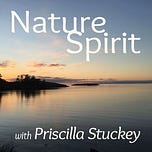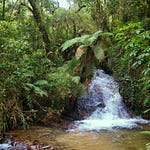How did Western culture get so disconnected from nature? Some people point to the scientific revolution of early modern Europe, with its quest to control nature. But where did those early scientists get the idea to conquer nature? Today we look at the famous theory of historian Lynn White in 1967—that the creation stories of Genesis taught medieval Christianity to “subdue nature.” It’s a theory that people still repeat today, even though most of White’s evidence has been refuted. We look especially at how centuries of Jewish teachers interpreted Genesis—as a cautionary tale about what happens when humans fail to take moral responsibility. If two religious traditions can read the same creation story in opposite ways, what does that say about how creation stories actually work? And where, again, does that urge to conquer nature come from?
Transcript
It’s a question many people are asking these days: How did we get so disconnected from nature? So that we can damage the very web of life? Where did we go wrong?
It’s a good question to ask because answering it might help us figure out how to change course. And we do need to make big changes—in our economies, our uses of energy. And especially in our mindset, because one habit of thought lies behind it all, and that is the idea that we are separate from nature and can control it.
So where did that idea come from—that we can bend weather and water and animals—and other humans—to our will? Or even that we’d want to?
It’s a mindset that grew up in Western culture, so one obvious place to look is at the sources of Western culture in Europe. And one of those sources is the book of Genesis.
The creation stories in Genesis do look like they support everything that’s wrong today in our relationship with nature. You can see it right there in Genesis 1. After God creates light and darkness, the heavens and the earth, the plants and the animals, God creates human beings and tells them, “Fill the earth and subdue it. Rule over the fish in the sea and the birds in the sky and over every living thing that moves on the ground.”
The command could hardly be clearer. And for hundreds of years, people in Europe were hearing this command from birth, absorbing it along with their mother’s milk. In early modern Europe, for instance, some of the men who launched the scientific revolution quoted this command from Genesis to explain exactly why they were doing what they were doing.
One of those men was Francis Bacon, who lived in England around the year 1600. Bacon is called the “father of modern science” because he developed an empirical method for looking at nature—using the senses to investigate nature instead of just speculating with the mind. Francis Bacon was proud of his method because he said it would allow people to pry nature’s secrets out of her. (To him nature was feminine, as it was to most people of the time.) Bacon wrote that through his new science he could prosecute nature, even torture her, to make her give up her secrets.
It was brutal language, and it came straight out of English courtrooms because Francis Bacon was also an attorney—in fact, for a few years the most powerful attorney in England, the attorney general for King James I. And the language of torture was uppermost in his mind because English courts during that very time were prosecuting witches. And torturing them.
So Bacon thought we might have to apply a few screws to nature, but once she spilled her secrets, humans would gain control over her, as he knew God had intended from the start. Because Bacon also read in Genesis that Adam and Eve lost their dominion over the earth after they left the Garden of Eden. But Bacon was full of faith; science could take us back to the garden. Bacon’s new method would put humans in charge of nature once again.
So, armed with Genesis and the scientific method, Western nations went on for hundreds of years to subdue nature. And to share their methods and mindset with the rest of the world.
Which, we can now see, isn’t working out so well.
And this is why, in the 1960s, an American history professor named Lynn White made Genesis the centerpiece of his address to a group of scientists. White was an expert in medieval Europe, especially in how Europeans during that time developed the technology to dominate nature. From about the year 1000 on, he said, Europeans invented the machines and methods that made both science and colonialism possible. So already by 1492—a hundred years before Francis Bacon—Europeans had the warships and the weapons powerful enough to sail across the oceans and loot and enslave along the way.
So why, Lynn White asked, did medieval Europeans think about the world as a place to conquer? And White pointed to Christianity, and especially to those stories in Genesis, which he said trained Europeans to think of themselves as separate from and superior to nature.
For evidence, he pointed to how early Christianity tried to destroy pagan animism by chopping down sacred trees. To Christians, he said, trees that have spirits are idols. So Christianity removed the spirit from nature, and in that way it also removed the limits on exploiting nature.
Going back even further in history, he argued that the pagan world of antiquity held a radically different view of time than the one portrayed in Genesis. In Genesis, he said, the cosmos has a clear beginning, with a Creator who stands outside the world and sets the events of history into motion, while the pagan neighbors of the ancient Hebrews experienced time as cyclical so that everything is held within it. And by teaching that humans are made in the image of God, he said, Genesis taught Jews and Christians to also stand outside nature.
Lynn White’s argument was a powerful one. And it took hold because White stood on a powerful platform. He gave the talk as a keynote at a scientific conference in late 1966, and it was published a few months later in the journal Science. From there it reached millions of people, and it has influenced thinking about religion and nature for more than half a century.
White laid responsibility for the ecological crisis squarely at the feet of Christianity and Judaism, and masses of people agreed with him. Even today you can hear people repeat all or part of his idea. They might talk about how revolutionary the Jewish idea of God was—a God who stood outside nature and created it. Or they might talk about the tragic story of Adam and Eve being expelled from the garden and cursed to work the earth, and how from this story people learn to be adversaries against nature.
And these connections to Genesis seem to make a lot of sense. Our creation stories do shape us. They inform our imaginations; they suggest the boundaries of what may and may not be done. And it is also true that the creation stories in Genesis are troubling. Deeply troubling. They talk of both the goodness of the earth and of human alienation from the earth. There’s a lot to explore there.
I also deeply agree with one of White’s main points: that taking the spirit out of nature reduced nature to things, and things can be used without limit. So at least part of where we went wrong is a spiritual problem, and so White called for a spiritual solution. He said, “We must rethink and refeel our nature and destiny.” By which he meant we need to reconsider who we are in relation to the rest of nature. And I am in deep kinship with him here, because this is exactly what I try to do—help us rethink who we are and help us recenter ourselves in feeling our relations with the rest of the creatures.
But the problem with White’s talk is that if you look at the actual history, very little of the evidence he used to support his argument actually holds up. Fifty years of hindsight show that what Lynn White the historian did was, essentially, to write a myth. He created a story about how Western culture got ourselves and the rest of the world into a terrible mess, and it’s a compelling story, as all good myths are, just because it rings so true.
But ringing true doesn’t mean something actually is true. So this is a place to proceed with caution. And I’ll mention only a couple of issues.
For one thing, the theory that the ancient Israelites saw history as linear while their neighbors experienced it as cyclical is long outdated. It was a mid-twentieth-century idea that I happen to remember because I’m old enough to have heard it repeated at the very beginning of my studies. But it was based on some dubious theories that turned out not to match the evidence.
Because the evidence shows that the God of Israel as portrayed in early Genesis created the world in a similar way, out of chaos, as did the gods of Israel’s neighbors. From Old Babylonia, in the territory of Mesopotamia, comes a creation story that long predated Genesis. And in that Babylonian story the gods bring order out of chaos, just as God does in Genesis, and then they form the human being out of clay.
And when scholars compare the creation stories in Genesis to the natural history of the Greeks, which was being formed around the same time as the final text of Genesis, around 400 to 500 BCE, they find many of the same elements: the firmament, the waters, the plants and animals—all appearing in the same order. And in Greek stories, when humans show up, as in Genesis they have a tendency to stand above or outside nature and to become the measure of all things.
In fact, the first eleven chapters of Genesis are remarkable for how closely they resemble the stories of their neighbors—and how different they sound from the rest of the book of Genesis as a result. It’s almost as if the people who collected Genesis into this form intended their creation stories to parallel those of their neighbors—maybe as a way of commenting on those neighboring cultures and religions. There’s a lot to talk about here too.
Another thing White got wrong was the idea that Christianity stood apart from Greco-Roman paganism because the pagans revered the spirits in trees or springs while the Christians didn’t. It is true that the Christians did not revere nature, but it is just as true that the pagans of Rome didn’t either. The story of Rome is a history of exploiting nature in ways that still sound familiar today: deforesting the land, extracting minerals, hunting down wild animals as trophies.
In fact, Roman paganism had almost nothing to do with worshiping nature and almost everything to do with upholding the social order. Roman culture was an urban one, organized around cities, so its official paganism was an urban and political kind. Citizens made public offerings and sacrifices to the cosmos, but they did it on behalf of the emperor so that heaven itself would support the authorities in the work of keeping order on earth. Making a public sacrifice was a civic duty. It was like a spiritual tax. It showed you were willing to do your part in upholding the common good.
So it was not Christians but pagan Romans who first persecuted the nature-worshiping tribes of Europe and Britain. In the first century CE Emperor Claudius banned the Druids of Gaul and outlawed their sacred rites. And some years later, as the Roman historian Tacitus reported, the Roman general from Britain sailed across the waters to conquer the last Druids on a far island of Wales. The Roman forces massacred those Druids and then chopped down their sacred groves to destroy Druid rituals and Druid power forever.
Now it is true that when Christianity later sat on the imperial throne, it reproduced those policies and practices, including chopping down sacred groves. So in the 700s, Charlemagne built a new empire based on the model of Rome but located in northern Europe, with Christianity at its center. He too marched his armies out to the hinterlands to conquer outlying tribes. He chopped down the sacred trees of the Germanic pagans who lived at the edges of his empire, and he massacred all the bears who lived in the forests, and he did it for the same reasons that the Romans had destroyed the Druids seven hundred years earlier—to conquer the holdouts, to exterminate their religion, and to extend the borders of an empire.
So just these few examples show that Lynn White wasn’t so right on some of his particulars. But what about his central idea—that what people think about themselves and nature determines what they do to nature? Do creation stories shape society as directly as White thought?
I think there’s good reason to say no, and here is that reason: Judaism understands the Genesis stories in radically different ways than Christianity does.
Norman Lamm was a leader of modern orthodoxy and the president of Yeshivah University when he wrote an early response to Lynn White. In it he talked about how the rabbis of the talmudic and midrash traditions interpreted the Genesis stories. Those traditions consist of centuries of rabbis from antiquity through the Middle Ages commenting on the Torah and on scriptures and on just about every aspect of Jewish life.
Norman Lamm said that when these rabbis talked about the creation stories in Genesis, they often repeated one saying: “God created the world by looking into the Torah as an architect into a blueprint.” In other words, the Law that shows people how to live decent lives stands at the very center of creation itself. It’s the pattern behind nature. So the rabbis could never talk about creation without also talking about how to be decent, responsible people within creation. Or, as Norman Lamm put it, “The survival of the world depends upon human acceptance of moral responsibility.”
This is a wildly different message to take from Genesis than the one Francis Bacon took. And yet the rabbis and Bacon shared a lot of cultural history. And they were reading the exact same texts! But one group heard a cautionary tale about being moral people and always practicing responsibility toward nature; the other heard a command to dominate nature—to wring all nature’s secrets out using torture if necessary.
It suggests that creation stories do not shape their societies in a straightforward or direct way, as Lynn White and others thought. Yes, a creation story can guide a culture that holds that story sacred, but if Genesis is any indicator, a creation story can guide people only along paths those people have already chosen. It suggests that Genesis isn’t so much determining the shape of people’s thinking as confirming the values different groups already hold.
Which only moves the question one step further back: How did Jews and Christians come to hold such different values that they read Genesis in nearly opposite ways? That’s a huge topic in itself, but we can touch here on one obvious difference: the two communities existed in very different relationship to political power.
To make a long story short, in medieval Europe Christianity was the ruling force, with the power to set laws, customs, and culture. Back in late antiquity, not long before the fall of Rome, Christianity had become the official religion of the empire, and for more than a thousand years after that it organized European life, including politics, religion, and the military. And it copied many of the policies of the empire and enforced them with many of the same tactics.
Judaism in the Middle Ages, by contrast, was a small minority that Christian neighbors often held in suspicion and periodically attacked and expelled from their towns. During the Roman Empire Judaism had held a small piece of power, the ability to govern its own territory. But even that power had been crushed when Romans destroyed the Temple in Jerusalem in the year 70 and gutted most of the city. Without a political and religious center, the Jewish people were forced to reorganize, and they gathered their identity into local synagogues across the empire and relied on local rabbis as teachers. This is when large parts of the Jewish oral tradition developed, with rabbis commenting on scripture and life.
In short, when Christians read Genesis, they read it through the eyes of empire. Recall that Francis Bacon worked for the king’s court in England. And many of the New Scientists in the generation after Bacon, those who formed the Royal Society of London, funded their science through the profits they made from investments—many of which were in the slave trade. There is a direct line of funding between slavery and the rise of Western science that we don’t talk about nearly often enough. Those early English scientists were building a new colonial empire, and it is no surprise that when those men read Genesis they could see only domination and control.
But when people today repeat that interpretation, they are doing two things. For one, they are continuing to give the privilege of interpretation to the colonizer, repeating the story of the world from the colonizer’s perspective. And also, they are ignoring centuries of Jewish reading of those same texts—their own Hebrew texts!—in a long history of interpretation that arose far from the centers of political and military power.
So it pains me when I hear people continue to lay the blame for our ecological crisis on the creation stories of Genesis—especially since we can now see that so much of Lynn White’s argument stands on shifting sand. We do ourselves no favors by repeating outdated explanations. We won’t truly understand why we’ve created such an ecological mess if we stop at obvious but inadequate answers.
I want to know more about how the long shadow of the Roman Empire reaches down to color so many aspects of modern life, including our law and customs and views of nature. And I want to reach even farther back, into those Mesopotamian roots of the Roman Empire, and into the Celtic cultures of pre-Roman Europe, and into the Indo-European roots of the Celts, and into prehistory itself to see what answers we may find there.
So, where did we go wrong? I don’t think we know yet. But we can’t wait until we’ve figured it out to make changes. So I wish each of you the power to do what is yours to do to help us bring human life into alignment with the web of life. The changes we need to make are massive. But even massive changes get built on small contributions. We’re all connected. Every change ripples outward and influences something else. Nothing we do is too small.
Wishing you the power and joy to keep making ripples of change.
For digging deeper
Genesis 1:28 is from the New International Version.
For how Francis Bacon borrowed the language of the courtroom, especially from the cases of prosecuting and torturing witches, see Carolyn Merchant, The Death of Nature (Harper & Row, 1980), chap. 7, especially 164–69. For how Bacon viewed science as restoring human dominion over nature, see Moody E. Prior, “Bacon’s Man of Science,” Journal of the History of Ideas 15, no. 3 (June 1954): 348–70. This influential essay from the fifties was likely one of the voices in Lynn White’s mind when he wrote his AAAS address in 1966.
Lynn White’s famous essay is “The Historical Roots of Our Ecological Crisis.” Science 155, no. 3767 (March 10, 1967): 1203–1207. Available as a pdf download at the Wikipedia article on Lynn White.
Fourteen different scholars reflect on the legacy of White’s essay in Religion and Ecological Crisis: The “Lynn White Thesis” at Fifty, edited by Todd LeVasseur and Anna Peterson (Routledge, 2017).
The theory White mentions that the Greeks and their neighbors held a cyclical view of time while time to the ancient Hebrews was linear stemmed from the twentieth-century historian of religions Mircea Eliade and is no longer widely held. Rather, both conceptions of time usually coexisted within the same ancient culture, and this seems to have been true of the ancient Hebrews as well. See the chapters in Time and Temporality in the Ancient World, edited by Ralph M. Rosen (Philadelphia: University of Pennsylvania Museum of Archaeology and Anthropology, 2004), especially the chapter by Marc Brettler, “Cyclical and Teleological Time in the Hebrew Bible,” 111–28.
A very recent article that addresses sacred time in rabbinic tradition is Lynn Kaye, “Sacred Time and Rabbinic Literature: New Directions for an Old Question,” Journal of the American Academy of Religion 88, no. 4 (Dec. 2020): 1154–77.
The idea that Gen. 1–11 intentionally parallels the creation stories of its neighbors, especially those from Mesopotamia, comes from Gordon J. Wenham, Word Biblical Commentary: Genesis 1–15 (Grand Rapids: Zondervan, 1987). From the “Source Criticism” section: “Within Gen 1–11 at least, a good case can be made for supposing that both the basic outline of primeval history and many elements within the stories existed prior to the [ancient Hebrew compilation of them]. . . . In fact, the Atrahasis epic from the early second millennium [BCE, in Old Babylonia] shows that the basic plot of Gen 1–11 was known already then. The Atrahasis epic tells of the creation of mankind, then of various divine judgments on him, culminating in the flood which destroyed all but Atrahasis and his family, who escaped in a boat. As in Genesis they offer a sacrifice on leaving the ark.”
For parallels between Genesis creation accounts and the cosmogonies of pre-Socratic Greeks, see the work of the Cambridge classicist F. M. Cornford, Principium Sapientiae: The Origins of Greek Philosophical Thought (Cambridge: Cambridge University Press, 1952), 200 and following, summarized by J. Baird Callicott in “Genesis Revisited: Murian Musings on the Lynn White, Jr., Debate,” Environmental History Review 14, nos. 1–2 (1990): 73–74.
During the reign of the Roman emperor Decius, in the third century, the Roman bureaucracy cracked down hard on those (like Christians) who refused to make the civic sacrifice. At that time the emperor issue certificates to those who complied, and failing to produce that slip of papyrus could cost you your life. See Paul Schubert, “On the Form and Content of the Certificates of Pagan Sacrifice,” Journal of Roman Studies 106 (2016): 172–98.
We’ve mentioned the Roman persecution of Druids on this podcast before, in the episode titled “Why Doesn’t Everyone Love Diversity?” from June 2021. Tacitus reports how the Roman general of Britain, Suetonius Paulinus, massacred the Druids on the island of Mona, present-day Angelsey in the northwest corner of Wales, in The Annals 14.29–30.
On Jewish interpretation of Genesis, see Norman Lamm, chapter 6 of his book Faith and Doubt: Studies in Traditional Jewish Thought, 3rd ed. (1972; New York: KTAV Publishing House, 2006), esp. 166. He said the rabbis taught that “upsetting the balance of nature” is “a curse.” Hava Tirosh-Samuelson underscores that the rabbis in the Middle Ages warned against exploiting nature. From Midrash Ecclesiastes Rabba 7:13: “The Holy Blessed One took the first human and passing before all the trees of the Garden of Eden said: ‘See my works, how fine and excellent they are? All that I created, I created for you. Reflect on this and do not corrupt or desolate my world; for if you do, there will be no one to repair it after you.’” See “Nature in the Sources of Judaism,” Daedalus 130, no. 4 (Fall 2001): 99–124.
For the connections between the Royal Society of London and the slave trade, see M. Govier, “The Royal Society, Slave Trade, and the Island of Jamaica, 1660–1700,” Notes and Records of the Royal Society of London 53 (1999): 203–17.
Environmental ethicist J. Baird Callicott looked at the tight connection Lynn White drew between what we think about nature, shaped by religious stories, and what we do to nature and called it “laughable.” See “The Historical Roots of Environmental Philosophy,” chap. 3 in Religion and Ecological Crisis: The “Lynn White Thesis” at Fifty, edited by Todd LeVasseur and Anna Peterson (Routledge, 2017), 44.












